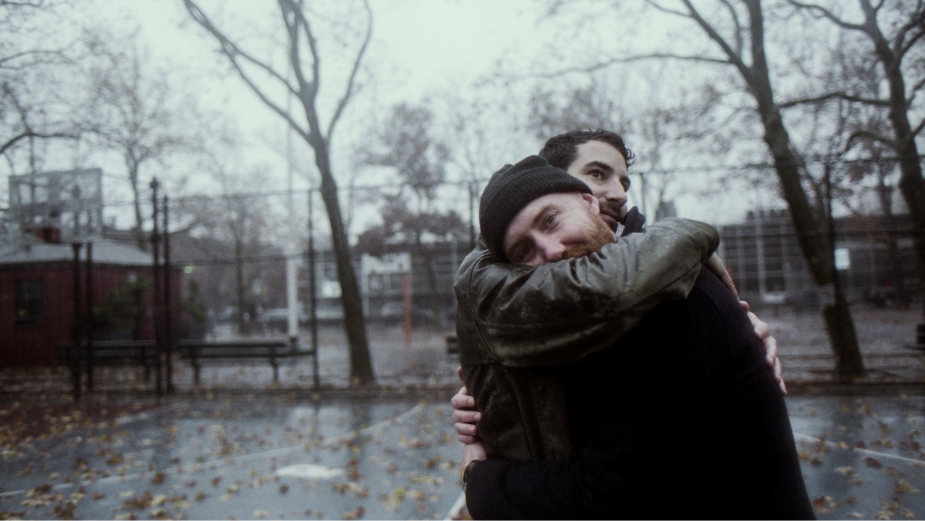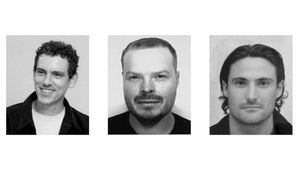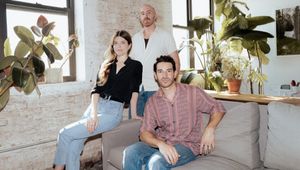
The Directors: Mark & Spencer

New York-based directors Mark Smith and Spencer Dennis met at a bus station in Sarajevo in 2005 (long story). They bonded over a shared love of cinema, music, photography, and design. They've developed their filmmaking voice together since joining forces as a directing duo in 2014. As they continue to evolve as creators, they seek out stories that explore truth, originality, and social good.
Working with both real people and experienced actors, Mark & Spencer are able to bring out performances that feel natural and real. This has led to successful campaigns for iconic brands, including AT&T, Adidas, Jack Daniel's, eBay, MTV, and Lincoln to name a few. In addition to commercial work, they collaborate with many non-profit organisations, most recently directing a global campaign for Doctors Without Borders.
Before directing full-time, both Mark and Spencer spent time as professional editors for commercials and music videos. This background informs their style, leading to films with a holistic conceptual approach and structure. They still love to cut their own work when they have the time.
In 2014, M&S founded Brooklyn-based creative production company Curfew. Collaborating with both emerging and veteran filmmakers, Curfew is an independent, craft-driven production company with capabilities worldwide. When they're not doing film stuff, Mark plays ice hockey and Spencer hugs his sheepdog.
Name: Mark & Spencer
Location: NY & LA
Repped by/in: Curfew in the USA
LBB> What elements of a script sets one apart from the other and what sort of scripts get you excited to shoot them?
Spencer> We get excited when a script takes a big swing and tries something new. When it feels like a first idea that hasn't been watered down by endless rounds of testing. When you can feel the excitement jump off the page while also welcoming creative collaborations down the line.
LBB> How do you approach creating a treatment for a spot?
Spencer> We both have editing backgrounds, so we like conceptualising the final product while piecing creative elements together. We like to make mood edits with footage and a song. Even if this doesn't get sent in for the pitch, it's good for us to get a sense of what we want the film to feel like.
Mark> It’s hard not to be influenced by other advertising work out there, so we try to start with a feature film or photographer we love that has a similar tone to the project. We’ll watch the film or check out a photo book to get inspired and use those references as a starting point.
LBB> If the script is for a brand that you're not familiar with/don't have a big affinity with or a market you're new to, how important is it for you to do research and understand that strategic and contextual side of the ad? If it's important to you, how do you do it?
Mark> If decades of brain-deleting social media have taught us anything, it's the power of perception and the mask you show the world. When we don't have a personal connection to the brand or product, we'll look at how they present themselves online. What do they want the world to see? Who are they trying to emulate? What do they not recognise about themselves? Then, we fill in the gaps in our presentation: a mix of how they see themselves, what they're striving towards, and what they don't know they need.
LBB> For you, what is the most important working relationship for a director to have with another person in making an ad? And why?
Mark> It's cheating for us to say co-director because we do every project together and love bouncing ideas around, tag-teaming production issues, and generally vibing on set. We've never done it any other way! But other than that, it would be line producer. There’s not enough time in the day to talk to everyone about every little thing, so you need someone you can trust to communicate your vision. It stops and starts with the producer, and we need to be able to trust them completely. Shout out to our amazing Curfew line producers!
Spencer> I totally agree with Mark. The most important relationship is our own :) I’ll also shout out the creative collaborators on the agency/brand side. Building trust early on with the creatives is so crucial to making a spot everyone is proud of at delivery. This trust leads to fewer discussions on set and more time to craft incredible footage.
LBB> What type of work are you most passionate about - is there a particular genre or subject matter or style you are most drawn to?
Spencer> We are interested in anything that goes beyond a traditional ad. Many directors seem to get siloed in certain genres, but I think we can work across various genres as long as the vision is clear. We like exploring human emotions and visual motifs and eliciting an indelible feeling from our audience. These values translate across many brands, concepts, and situations.
LBB> What misconception about you or your work do you most often encounter and why is it wrong?
Mark> People think we are a department store based in the UK - we believe people are wrong about that. We are two handsome American men with nothing to lose.
Spencer> As evident in Mark’s answer above, we can (and love to) do comedy work.
LBB> What's the craziest problem you've come across in the course of a production – and how did you solve it?
Mark> To preface this story, we have nothing against the fine city and people of Detroit. But we were once shooting an ambitious project in a grungy old warehouse where they used to make Model Ts. Running from floor to floor to get various setups, we barely noticed the sirens surrounding the building. Finally, our line producer whispered to us: "Some kids broke in and found a dead body in an abandoned wing of the building"!!! We “solved” this problem by ignoring it until we got more info and distracting the agency with jangling keys. It turns out it was just a mannequin, which is also unsettling to find in an abandoned warehouse but in a funny way, not a tragic way.
LBB> How do you strike the balance between being open/collaborative with the agency and brand client while also protecting the idea?
Mark> Our best jobs are the ones where the Director's Cut and the Agency's Cut are the same. For a variety of reasons, this doesn't always happen. But when you can get everyone excited about your vision early on, it makes the whole process much smoother and more fun. If you can take a big swing in the treatment phase and get people on board with your take, it becomes more of a collaboration as the production proceeds. Everyone is working towards the same goal, and you're not trying to pull a fast one on the client or agency to get what you want.
LBB> What are your thoughts on opening up the production world to a more diverse pool of talent? Are you open to mentoring and apprenticeships on set?
Spencer> We are extremely supportive of a more diverse pool of talent in our industry. One of the great things about being partners in our production company is that we can represent and encourage female, POC, and queer directors during a time when we need to uplift different perspectives more than ever. There are many ways to bring new voices into the mix: mentorships on set, utilising programs such as Double the Line, or pushing for more inclusivity in talent selection, to name a few. We've often seen clients asking for diverse directors, but ultimately don’t award them the job because they don't have the exact type of spot on their reel. We push for this to change and for a greater perspective as to why underrepresented directors often don't have enough work on their reels. Breaking this cycle is key to seeing real change.
LBB> How do you feel the pandemic is going to influence the way you work into the longer term? Have you picked up new habits that you feel will stick around for a long time?
Spencer> The pandemic sped up many things that were already happening: faster timelines, smaller budgets, always-on communication, and more need for vertical video. That said, it's important to set meaningful boundaries regarding client expectations.
Mark> Even if someone is always willing to do something cheaper and faster, we are confident that success in this business lies in values and relationships. We're not interested in a race to the bottom; we try to cultivate relationships that respect these values.
LBB> Your work is now presented in so many different formats - to what extent do you keep each in mind while you're working (and, equally, to what degree is it possible to do so)?
Spencer> We've come up in a world where the first few frames or a project cover image can keep someone interested in seeing more or moving on. We keep this in mind when we craft every frame of a project. How do we tell a story in a frame, from the casting, art direction, lighting, focal length and performance? This is what we ask each other when prepping for a job and then when we’re actually on set. If we stay true to this method of filmmaking, the project can live in whatever format our client prefers and we’ll be proud of what we’ve made.
LBB> What's your relationship with new technology and, if at all, how do you incorporate future-facing tech into your work (e.g. virtual production, interactive storytelling, AI/data-driven visuals etc)?
Spencer> We're old-fashioned filmmakers at heart, but if anyone is more interested in technology, it's me. There is definitely some fear that AI is going to make our jobs obsolete, but if we understand the technology, perhaps we can show why real humans are better. 🙂
CTIA - This was our most recent completed project and one that marks a shift in the genres we’re exploring. We love projects like this that promote something helpful for our society (without being heavy-handed) while honing our skills in casting, performance, art direction, and cinematography.
Doctors Without Borders - This project was special for us because we wrote and developed the concept from the very beginning, which can be rare in our line of work. We were able to pull off some complex film techniques with a very tiny budget and we’re proud of what we were able to accomplish. Again, working to promote a good cause with a visually striking film feels like the perfect intersection of our values.
Adidas EQT - Cities - Working with Adidas to highlight local change-makers from across the country was another dream project. Capturing these real stories using cinematic language to empower and present their ideas was a really satisfying experience. There was a ton to accomplish in 2 days, so splitting up as Directors and running two units proved to be super valuable.
Lifetime - Enjoy Being a Girl - This was a spot earlier on in our career where we again had the opportunity to pitch the creative concept, write the scenes, and develop the visual language. It was a whirlwind production shooting 14 scenes in two days with an incredible cast and crew in Atlanta. This project made a splash when it came out and pushed our career forward in a real way, so it has a special place in our hearts.















